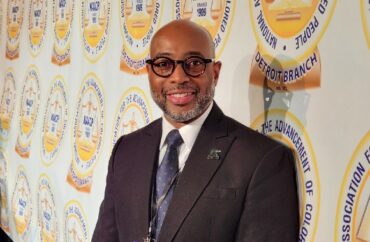
Complaint cites almost 40 examples of alleged plagiarism by Dean Jerlando Jackson
A Michigan State University dean is facing allegations of plagiarism throughout his nearly 30-year career in a recent complaint, but neither he nor the university has commented on the accusations.
The official complaint, first reported by the Washington Free Beacon, cites almost 40 examples of alleged plagiarism by Jerlando Jackson, the dean of MSU’s College of Education.
Michigan State spokesperson Emily Gerkin Guerrant declined to comment in a recent email to The College Fix when asked about the complaint.
“The university does not comment directly on plagiarism cases, but from a process standpoint when concerns are brought forward, they are reviewed by the MSU Research Integrity Office,” Guerrant said.
Guerrant gave the same response when The Fix contacted members of the Research Integrity Office, asking about the status of the complaint and the course of action if a faculty or staff member is found to be guilty of plagiarism.
Jackson also did not respond to several emails over the past few weeks, asking for his response to the allegations.
The complaint against Jackson cites examples from his Ph.D. thesis and eight other papers.
In one example, Free Beacon reporter Aaron Sibarium posted a side-by-side comparison of a paper Jackson wrote in 2002 and another by Lorraine McDonnell, a University of California at Santa Barbara political scientist, and the late Professor Richard Elmore of Harvard University, that show nearly duplicate paragraphs.
The excerpt from Jackson’s paper read, “Despite the number of unanswered questions and the size of the future research agenda, the focus on retaining administrators of color at PWIs [predominantly white institutions] is a productive one.”
In comparison, McDonnell’s and Elmore’s paper read, “Despite the number of unanswered questions and the size of the future research agenda, we feel that the focus on policy instruments is a productive approach.”
In one 2002 paper, he lifts pages of material from Lorraine McDonnell, a political scientist at UCSB, and Richard Elmore, a professor at Harvard’s Grad School of Education, without attribution, keeping the order of their sentences while swapping out synonyms and details. pic.twitter.com/k0i4wMlhkM
— Aaron Sibarium (@aaronsibarium) October 8, 2024
McDonnell did not answer two requests for comment from The College Fix via email, asking for her response to the claim that her work had been plagiarized. Elmore died in 2021.
In March, Jackson also was linked to another plagiarism complaint. The allegations involved two papers that he co-authored with the University of Wisconsin-Madison’s chief diversity officer, LaVar Charleston, according to the Free Beacon.
Reports of plagiarism have been a frequent problem among esteemed institutions as of late.
Earlier this year, Columbia University President Minouche Shafik was accused of plagiarizing a 30-year-old paper; however, the university dismissed the claim and other scholars questioned the allegation, The Fix reported at the time.
Others include former Harvard University President Claudine Gay, a Department of Equity and Inclusion leader from UCLA’s medical school, University of Washington professor and author Robin DiAngelo, a celebrated professor of medicine at the University of Southern California, and others.
But unlike many of the other university leaders accused of plagiarism, “Jackson has direct oversight of both academic programs and student discipline,” the Free Beacon‘s Sibarium wrote on X.
“And he is not just an administrator but a scholar—with 100s of papers under his belt and grants from the [National Science Foundation] —albeit one who studies DEI programs for a living,” Sibarium wrote.
MORE: DEI scholar Robin DiAngelo avoids plagiarism sanctions
At Michigan State, students are told that even “accidental” plagiarism is wrong and could be subject to discipline.
According to the university Ombudsperson’s website, “… students are held to the same standards whether or not they knew they were plagiarizing or whether or not they were plagiarizing themselves or someone else.”
The university also works to prevent plagiarism among faculty and staff. It uses a tool called iThenticate to scan “drafts of research articles and grant proposals for missed citations and other mistakes that could be characterized as plagiarism prior to submission or publication,” according to its website.
Contacted about plagiarism in academia, Christian Miller, a former director of The Honesty Project at Wake Forest University, told The Fix that technology has played a big role in detecting the problem.
“One reason there have been so many plagiarism allegations recently is that plagiarism is now far easier to detect,” Miller said in an email Monday. “It is not clear to me whether plagiarism by academics is on the rise in recent decades (although AI-based cheating especially by students is certainly on the rise).”
Miller, a philosophy professor, said he was not familiar with the complaint against Michigan State’s dean.
But generally, he said universities can “encourage honest scholarly work” by adopting clear policies and consistently-enforced disciplinary measures for cases of plagiarism.
“Harvard, it turns out, has an excellent policy … With clear standards, professors should know that even unintentional uses of material by other scholars without acknowledgement, will still count as plagiarism,” he told The Fix.
“Finally, I would emphasize the creation of a culture of honesty, starting at the top with the President and administration serving as exemplars of honesty, and making sure it pervades the entire campus,” Miller said.
MORE: Michigan State professor fired for plagiarism
IMAGE: Jerlando Jackson/X
Like The College Fix on Facebook / Follow us on Twitter






Please join the conversation about our stories on Facebook, Twitter, Instagram, Reddit, MeWe, Rumble, Gab, Minds and Gettr.